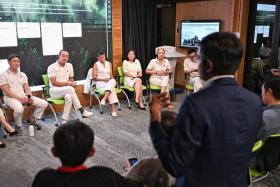Delay in projects to transform Lim Chu Kang into food hub
Two large-scale agri-tech projects in Lim Chu Kang, meant to help turn the rural north-western district into a high-tech food hub, have been delayed.
Developmental work for the Lim Chu Kang masterplan, announced by the Singapore Food Agency (SFA) in 2020 as an initiative to redevelop some 390ha of land there into a high-productivity agri-food zone, was meant to commence in 2024.
When asked for an update on the masterplan, an SFA spokesman told The Straits Times that it is still in the “feasibility study and planning phase” – the first of a four-step process, which also involves design development, construction and operations.
Separately, construction work for the Agri-Food Innovation Park (AFIP) in the Sungei Kadut area, which was meant to be completed from the second quarter of 2021, has also stalled.
The AFIP, announced in 2019 by the Ministry of Trade and Industry (MTI), is meant to bring together high-tech urban farming and associated research and development activities in Singapore’s agri-tech and food zone, near the Lim Chu Kang farms and other food-related industries in Senoko.
But no buildings or construction work was seen at the site when ST visited in October. There were several tractors on site, but little activity going on in the area.
According to previous media reports, construction work for the AFIP had to stop for about five months in 2020 due to the Covid-19 pandemic.
Woodland at the site was cleared in 2020 and 2021, before an environmental study was completed. The unauthorised clearance was flagged in January 2021, and work stopped as investigations went on. In November 2023, the contractors involved were fined for prematurely felling the trees.
Responding to queries from ST, JTC Corporation, an agency under MTI overseeing the development of the AFIP, and SFA said plans for the development of the park are being worked out, and details will be announced when they are ready. They did not say what caused the delays.
SFA has said the 30 by 30 vision – which outlines the goal for Singapore to produce 30 per cent of its nutritional needs by 2030 – is a stretch ambition to ensure local produce can serve as a buffer during supply chain disruptions.
As at 2023, Singapore imports around 90 per cent of its food supply from 187 countries.
The master planning of the Lim Chu Kang region into a highly productive agri-food zone will help Singapore raise local food production in a sustainable manner to enhance the country’s food security, said the SFA spokesman.
SFA said it has been conducting environmental studies since 2021 to understand the impact of sustainable farming activities, so that any effect on biodiversity can be managed. Actual site investigations will commence later in 2024.
The agency is also concurrently working with stakeholders and partners to engage prospective companies and tenants for Lim Chu Kang.
“This encompasses engaging best-in-class overseas players willing to establish a presence in Singapore, further advancing the growth of our agri-tech sector,” said the SFA spokesman.
A major constraint in boosting the farming sector is the limited land available, with only 1 per cent of land in the country set aside for agricultural food production.
Get The New Paper on your phone with the free TNP app. Download from the Apple App Store or Google Play Store now

